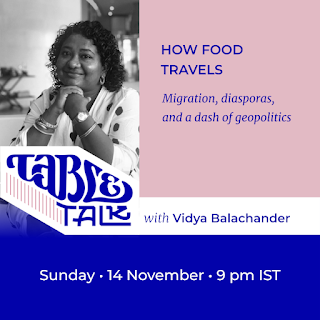Table Talk with Kishi Arora
Date: November 28, 2021
Time: 21:00 IST
You would think having a pal who is a pastry chef — qualified from the Culinary Institute of America no less — would be a really useful thing, right? But for over a decade now, Kishi has been sending me photographs of cake for my birthday. Would you think someone with as angelic a face could be so cruel?
Seriously though, I’m a long-time fan of hers. I first met Kishi when she was among a group of TED India Fellows I knew, and as is the way of this world, most of our subsequent friendship has been over social media, with that combination of distance and affection that so many of us know. Kishi’s a highly qualified chef, as I said, who worked in the USA and Singapore before coming back to India, where she has been a consultant for brands like Mad Over Donuts and Nature’s Basket, and Godfrey Philips India. She is also an entrepreneur, with her company Foodaholics which currently has her own line of custom-made desserts and her mother’s home-cooked meals business, Mama K Treats.
We will talk about her culinary journey and influences, as we usually do at Table Talk, before we learn what the crucial differences are between being an accomplished home cook and being a chef planning and executing menus for a changing cast of consumers, and the even more different demands and learnings of being a culinary entrepreneur. As ever, be prepared for digressions — these are conversations, not formal interviews — and you’re welcome to nudge us into them or back on topic.
We’ll chat for at least a couple of hours, including questions from and discussion with the audience, and may go on longer (three hours has been fairly routine for Table Talk, and we’ve gone as long as five).
Giving back
Table Talk will stay free to attend and free to listen to or watch later, for as long as I can afford to keep it that way. But we would like to use our privilege to help others, so we’re asking our guests to choose a cause.
Kishi’s choice is Aid India, which works with marginalised communities, helping them become self-reliant by providing support for education, healthcare and shelter. You can donate to their work here.
Attending
You will need to go to the Zoom link and register with a valid email address, after which you will get the link to join the event.
To get notifications of new episodes and links to past episodes, please subscribe to:
- this Google Group: https://groups.google.com/d/forum/ttandfps
- and / or this Telegram Channel: https://t.me/TTandFPS
(About Table Talk and past guests.)

